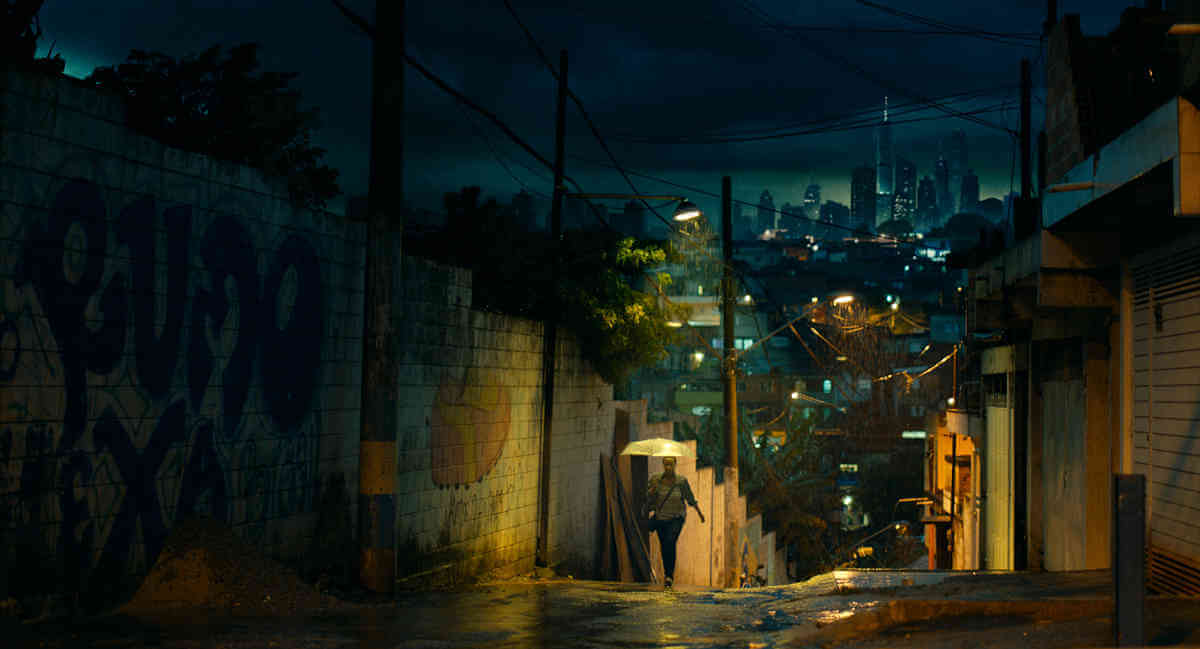“Good Manners” is a strange and wondrous fable. A Brazilian fantasy and stinging social commentary, it features motherhood, lesbian passions, and werewolf instincts, plus a few musical numbers thrown in for good measure. The film is the brainchild of co-writers/ directors Juliana Rojas and Marco Dutra, the latter whose boyfriend John Trengove directed last year’s “The Wound.”
In São Paulo, Clara, an Afro-Brazilian woman, applies for a job as a nanny for Ana, who is pregnant with her first child. The interview is a bit awkward, but when Ana experiences some pangs, Clara manipulates her body and soothes her, prompting Ana to hire her.
Clara soon learns that Ana may be rich but she is also bored and lonely. She keeps a gun in the house, exercises, drinks beer, and maxes out a credit card on expensive shoes. Ana tells Clara what she learned about etiquette at finishing school, but also how her father threw her out of the house after she got pregnant and why she ditched her fiancé. When Ana explains the backstory of Ana’s baby daddy, Rojas and Dutra present the episode in a series of vividly illustrated panels depicting their strange sexual encounter. It is not much of a spoiler to say that the man who impregnated her was a werewolf.
That revelation explains why Ana sleepwalks barefoot through the city at night, feeding on an animal she kills. Clara, understanding her employer’s strange behavior, cuts herself to add blood to a pasta dish she prepares for Ana, satisfying the bloodthirsty pregnant woman’s cravings. (Ana’s doctor had told her not to eat meat.) Ana also has sexual designs on Clara; during a full moon, she hungrily devours her employee, kissing her, biting her, and engaging in some very passionate sex.
Power shifts between Ana and Clara in unexpected ways, and it’s not clear if their relationship is built on love, codependence, or convenience. Or something sinister. Despite the film’s fantastical elements, “Good Manners” plays most of the dramatic action at face value, even if the city, with its tony mall and empty streets, and Ana’s chic apartment seem otherworldly.
The story doesn’t really go full throttle into wild and crazy until its midpoint, when Ana unexpectedly gives birth in an unusual and violent way. The scene is shocking and funny and unsettling — and sets up the film’s critical second act. The birth scene is wisely followed by one of the film’s musical numbers, giving viewers a chance to catch their breath after a Grand Guignol moment.
It’s not surprising that Ana’s baby prefers blood over milk when breastfeeding. Clara, raising the child, Joel (Miguel Lobo), works to keep his identity as a wolf-boy a secret — especially during the full moon. She creates a “little bedroom” for him to stay in, chained to the wall, so his transformation to beast won’t be a threat to anyone. Of course, it is only a matter of time before Joel’s true identity is discovered.
Joel’s secret double life, which the child at first only senses without really understanding, will certainly resonate with queer viewers. But his relationship with caregiver Clara, while important, does not have the same tension as the one between Clara and Ana. That may be why the film flags a bit in its second half, as viewers wait for Joel to break bad.
The “action” scenes, when they occur, are discreetly filmed — perhaps because children are involved — and this deliberately stylized approach may prompt chuckles from viewers who find the situations darkly funny. Rojas and Dutra moralize here, as the unfolding horrors spur a mob mentality against what Joel has become.
But are the filmmakers being too polite by not having “Good Manners” go for the jugular once it reveals its hairy hand? Perhaps. But this is a minor drawback in an incredibly well made film.
As Clara, Isabél Zuaa maintains an air of mystery about her that makes her intriguing to watch throughout. A scene in a bar where she meets a woman who is attracted to her and tries to size her up is particularly satisfying in how she maintains her composure. Zuaa impressively conveys Clara being under control through most of the first act, while trying to be in control thereafter.
In support, Miguel Lobo is superb as Joel, a timid boy whose fears about everything are apparent in his facial expressions and body language, and Marjorie Estiano makes the complicated Ana more sympathetic than unlikeable. Like everything else in this fine film, Ana is not what she appears to be.
____
GOOD MANNERS | Directed by Juliana Rojas and Marco Dutra | In Portuguese, with English subtitles | Distrib Films US | Opens Jul. 27 | IFC Center, 323 Sixth Ave. at W. Third St. | ifccenter.com



































